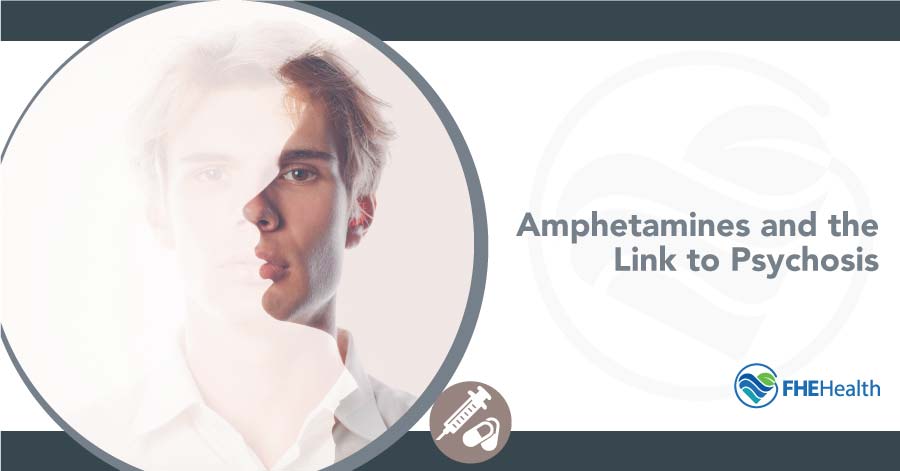
Amphetamines are a group of stimulant drugs that affect the central nervous system. They cause faster communication between your brain and body, making you more alert and physically active. Some commonly prescribed amphetamines are Adderall and Dexedrine. However, methamphetamines are a more potent form of amphetamines sold on the street.
Most people have an idea of the effects of amphetamines, or what “tweaking” from meth is, from life or Hollywood depictions in films. But what is it about amphetamines that causes psychosis? What is this amphetamine mental health condition?
What Is Psychosis?
The state of psychosis is a condition affecting the mind in which you lose your sense of what’s real and what’s not. Experiencing a state of psychosis is also referred to as having a psychotic episode. During this phase, you may have altered or disturbed perceptions of reality and have difficulty determining what’s real.
Symptoms of psychosis include:
- Delusions
- Hallucinations
- Incoherent speech
- Inappropriate behavior
Social withdrawal, anxiety, depression and insomnia can also accompany the state of psychosis brought on by amphetamine use disorders.
According to the National Alliance of Mental Illness (NAMI), 3 in 100 Americans will experience at least one psychotic episode in their lives. With a link between psychosis and stimulant drug use, it’s unsurprising the condition occurs so frequently in the United States. In 2018, the Substance Abuse and Mental Health Services Administration reported that 60.2% of Americans 12 and older had used tobacco, alcohol or illicit drugs within the past month.
Acute Psychosis vs Schizophrenia
Psychosis is a complex mental health symptom with various forms and causes. It’s important to understand that there’s a difference between acute psychosis and schizophrenic psychosis. Schizophrenic psychosis occurs as a symptom of the mental health condition called schizophrenia, resulting in delusions and hallucinations.
However, acute psychosis can occur as part of many mental health conditions or on its own due to the use of substances like amphetamines.
The Effects of Amphetamines That Induce Psychosis
Drug induced psychosis occurs in 8% to 46% of people who regularly use amphetamines. Research indicates that the use of amphetamines can trigger acute psychosis in individuals.
However, it’s unclear to researchers what the exact effects of amphetamines that induce psychosis are. A review of multiple studies from 2012 suggests there are common vulnerabilities in individuals for drug abuse and a tendency towards psychosis. This could provide one explanation for the link between psychosis and the use of amphetamines.
In some cases, however, the sleep deprivation brought on by nervous system stimulation could be a contributing factor to the psychosis. The use of other drugs and the presence of other mental health conditions may increase the risk of developing amphetamine psychosis.
There are also links between amphetamine-induced and primary psychosis. Primary psychosis is a symptom of a psychiatric disorder, whereas secondary psychosis is the result of a medical condition. Abnormal brain function in the prefrontal and temporal cortices and sensitization phenomena may contribute to acute primary psychosis in amphetamine users, according to a 2016 report.
It’s also likely that environmental factors contribute to the occurrence of psychosis in combination with drug use and genetic predisposition. According to NAMI, youth in juvenile detention are 10 times more likely to experience psychosis than those living in a traditional community.
How Long Do These Amphetamine Mental Health Effects Last?
In some studies, amphetamines were given to subjects in increasingly higher dosages until symptoms of psychosis occurred. According to available data, psychosis set in after 100-300 mg of amphetamines were administered, and symptoms persisted for approximately 6 days.
A long-term follow-up of patients treated for drug abuse with psychotic symptoms found that 60% of those who stopped using amphetamines saw their symptoms subside within 1 month. 30% of these patients continued to have symptoms of psychosis for 1 to 6 months after stopping amphetamine use. Just 10% had persistent symptoms longer than 6 months, and half of these individuals were eventually diagnosed with schizophrenia, indicating the psychosis was not a direct result of amphetamine use.
The reason symptoms can persist even after drugs leave your system is that it takes time for your brain chemistry to return to normal. Depending on how quickly this happens, individuals may experience relief from psychosis within days, weeks or months of stopping the use of amphetamines.
Is There Permanent Damage From Psychosis?
If left untreated, research suggests that psychosis can result in permanent neurological damage. However, as with many medical conditions, early intervention and treatment can improve long-term outcomes.
The duration of untreated psychosis (DUP) is defined as the time between active symptom onset and the beginning of treatment using antipsychotics. While there’s some evidence that a longer DUP can lead to a neurotoxic effect on brain structure, available research is currently limited due to the small group size sampled in studies.
The best course of action for preventing long-term repercussions of psychosis is to seek professional help if you or someone you love is experiencing these amphetamine psychosis symptoms. Whether due to amphetamine use or another condition, it’s critical to get support for a psychotic episode to ensure recovery.
How To Seek Professional Help
To manage symptoms of psychosis brought on by amphetamine use, it’s essential to stop the drug abuse habits and focus on your recovery. Though this can be challenging, undergoing a detox protocol through inpatient care is often the first step to a better life after drug addiction struggles.
At FHE Health, we offer inpatient and outpatient programs for managing addiction and building healthy habits to improve your quality of life. Our compassionate counselors are available to take your call around the clock so you can get the help you need at any time.
Start your journey to recovery today by calling us at (833) 596-3502. We can discuss your available amphetamine treatment options and create a recovery plan that sets you up for success.






